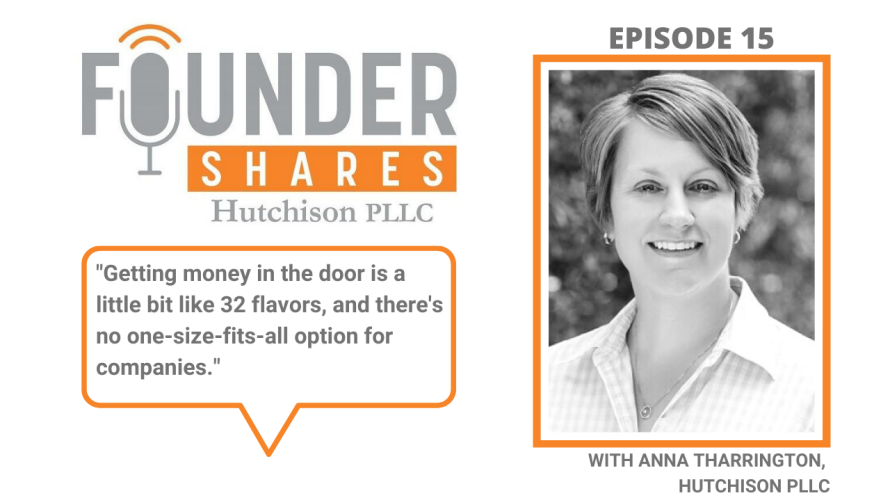Startup Funding Questions Answered by Anna Tharrington

You might have the best startup idea in the world, but you’re going to need some sort of capital to get it off of the ground. How do you make it, where does it come from and what are you giving up to get it?
On the latest episode of the Founder Shares podcast, we spoke with Hutchison partner Anna Tharrington to get the answers to that question. With her extensive experience in all things angel investing and venture capital financing, she was the perfect person to ask.
At Hutchison, we specialize in working with, what we call, growth companies—technology, biotech, life sciences and the like. Depending on the stage of the venture, a company’s needs might vary, but there’s a common theme of needing representation to form the company and raising funds through outside capital in order to grow, scale and, ultimately, sell their business.
But there’s a lot of different ways for companies to fundraise.
“Getting money in the door is a little bit like 32 flavors,” Anna said, “and there's no one-size-fits-all option for companies. Yeah, we see companies that are lucky enough to raise capital from non-dilutive grants—by not selling part of the company—but for most of our clients that's just not enough.”
Anna said that, for her clients to get the level of growth and scale they need, they’re going to need to talk with angel investors, wealthy individuals or groups of individuals who share capital in exchange for convertible securities or equity, or venture capitalists, private equity investors that share capital in exchange for equity, about larger checks that will enable them to grow quickly, gain a competitive edge and get to the next round.
“So, part of our job as counselors to these companies is helping them work through which one of those avenues makes the most sense for them now,” Anna said. “And for a lot of companies, if they are at a point where they need a couple hundred thousand dollars to get to a really big contract, investment may make a lot of sense for them.”
Once they have money in the door, founders may be able to use it to increase their company’s value. And with the higher value, they’ll have a higher valuation when they go to sell stock at a later round, meaning that they’ll sell less of their company—which is good for founders.
But raising money only matters so much if it isn’t the right amount.
“Because if what you really need to get you to the next round, and a higher valuation, is $500,000 or a million dollars, you don't really want to take 2 million,” Anna said. “At this lower valuation, you're going to give up more of the company, which isn't great for you as a founder.”
And as they move into deal mode, Hutchison is there for business advice and quality checks of the legal documentation, leaving founders comfortable knowing they made the best decision for their company.
“For clients, surround yourself with good people, surround yourself with good advisors and people that are familiar with what you're doing,” Anna said. “Whether that's good accountants, good lawyers or just good business mentors, they will be able to tell you about their mistakes so you don't have to make all of them yourself.”
To hear the rest of the conversation—and all of Anna’s advice—check out the Founder Shares podcast, available wherever you like to listen.
The blog content should not be construed as legal advice.


Show Comments / Leave a Comment
Comments
There are no comments yet.
Leave a Comment